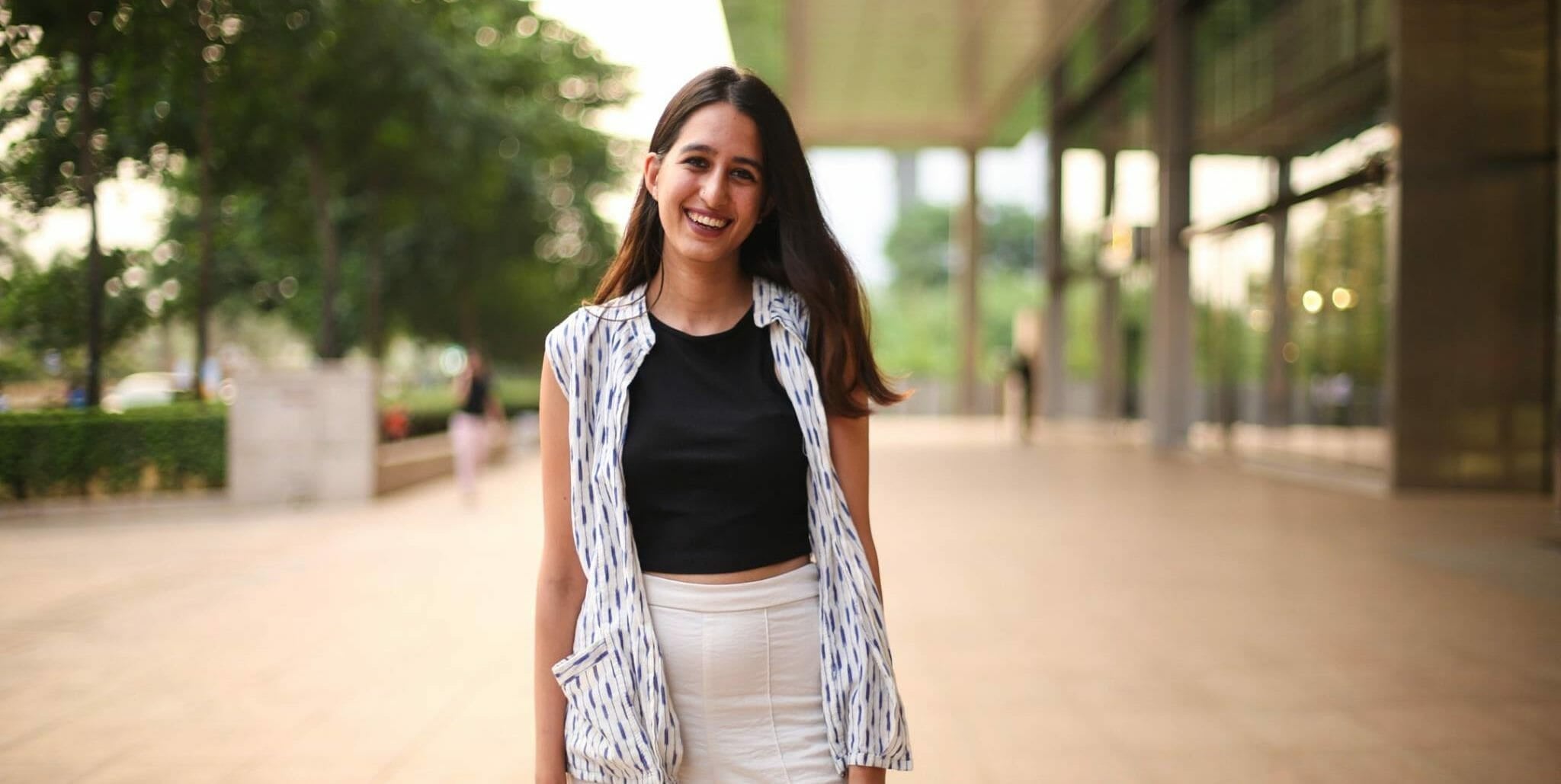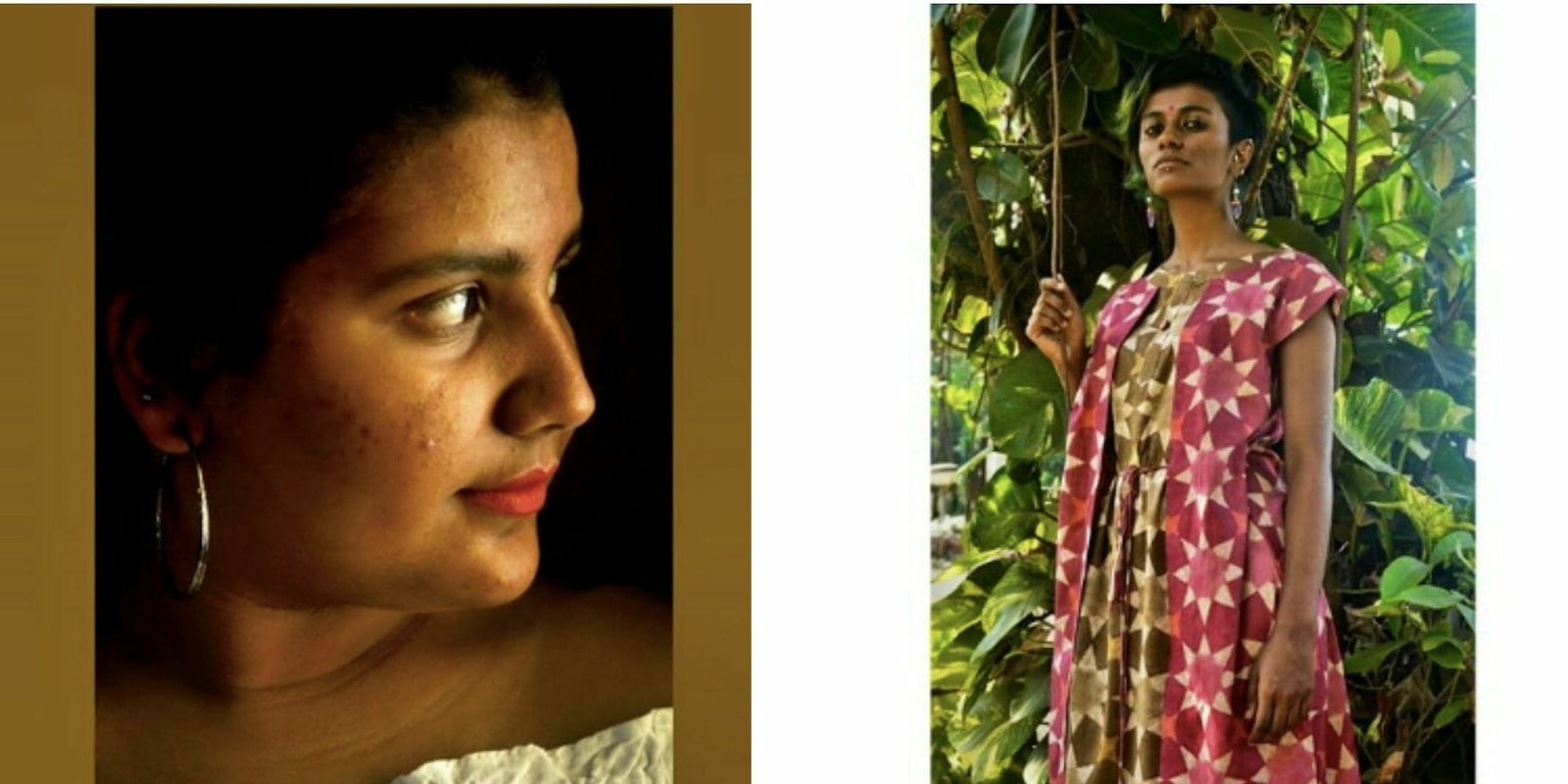It’s a veritable skin show. There are scars, body hair, stretch marks, pimples, freckles, tattoos, and sometimes makeup. The women, whose skin is on display, are different in every aspect.
Except for their skin color. All of them are brown.
https://www.instagram.com/p/Bqhb_e3DT5V/
In March, photographer Anusha Kelkar, 22, started documenting the relationship women in India have with their bodies on her Instagram page, Brown Girl Gazin. Her mission: to make honest portraits of women while redefining beauty standards.
In India, fairness is equated with beauty. Take, for instance, the numerous ads promoting whitening creams. A typical beauty is also expected to be slim, delicate, acne-free, with long, straight hair, big eyes, and no visible body hair.
“Often on social media there is a pressure for people to showcase the best versions of themselves and their bodies,” Kellar tells the Daily Dot. “I think for women in our society especially, there is an added pressure to constantly look and feel good but to do this you have to fit into a very narrow definition of beauty.”
The slim and fair Kelkar fits into the conventional Indian standards of beauty. Yet, she’s not always had an easy and comfortable relationship with her body. “I want to be indifferent to every pimple, every extra kilo, and every single annoying aunty or boy or neighbor who gave me yet another suggestion about what they thought I should do with my body,” she says. “I still care way too much about every single visible flaw, and when I get a new pimple I can’t help but feel like the universe is just out to get me.”

Brown Girl Gazin was born out of personal experience. As a literature and journalism student at Ashoka University in Delhi, she found herself living in a hostel with 30 other women. They were all dealing with their own personal inadequacies and body issues, but they shared a personal space where they could freely discuss these insecurities.
Kelkar decided she wanted to take this space online and share more representative images of women. These images wouldn’t fit conventional standards and wouldn’t have flaws airbrushed away. She started with a list of certain kind of faces and bodies that she didn’t see well represented in the media. The first portraits went up this spring, and within days, became extremely popular. The page hasn’t seen the virality associated with celeb or pet accounts, but it has achieved something better: It has become a safe space for women to talk about their bodies.
The testimonies of the women touch upon acne, dark skin, flat chests, body hair, curly hair, short hair, height, piercings, glasses, tattoos. They highlight just how much pressure society puts on women to look “beautiful,” and from a young age. Yet, going through the Brown Girl Gazin feed is inspiring—these are women who’ve struggled with their bodies but are now embracing them.
One woman shares the changes in her body caused by her bipolar medication. Another woman shares the scars from when her alcoholic abusive father burned her as a child: “My scars are monuments of survival—proof that even if I feel like damaged goods, I am unbreakable.” Another has these words to share: “I’m both unapologetically narcissistic and have stopped taking my body seriously, in that, I now know how to have fun with it, instead of always stressing. My body is neither a machine, nor a temple.”
Behind the scenes
The project is the first of its kind for Kelkar. She started taking photographs when she was just 17, practicing on her mother’s camera. “I’ve always been obsessed with documenting the world around me—to stop and record how I was seeing and feeling a particular moment. Photography has been my favorite medium for the last five years; it’s allowed me to find my voice,” she says.
https://www.instagram.com/p/Bl7iNVZgbqw/
In Brown Girl Gazin, she has used her photography as the medium to amplify other voices. In her toolkit is a camera, the desire to change the narrative around women’s beauty, and her studies, which looked at gender theory and how societies are formed.
Kelkar started by photographing her friends and women she found on campus (through notice boards and informal chats). Then, she opened up her inbox to volunteers, and the numbers just keep increasing. She uploads the photographs in a series, allowing her subject the space to open up and get comfortable. “Every subject has a completely different relationship with their body. They have different reasons for choosing to be a part of this project. For some, it’s a way to finally address insecurities or body image issues that they have had for a long time but haven’t confronted. For others, it’s a way to celebrate their lives and to document a time where they feel at home in their bodies,” she says.
Rishika Basu Majumdar, a psychology major in Delhi, tells the Daily Dot it was “a liberating experience.” Majumdar heard about the project and got in touch with Kelkar offering to tell her story. Her portrait series on BGGI talks about growing up hating her coloring because she was bullied for it in her co-ed school. “My skin colour has been a defining factor in my life for a long time. I had never spoken much about it, except to friends.” After the series came out, she had friends messaging her for being brave enough to share her story. “BGGI was one of the things that helped me feel comfortable in my skin and accept it,” she says.
The frames have natural light and green plants, but the focus is on the women and their bodies. There is no “dress code” or censorship on how much skin to show: Kelkar leaves it to the person to define their portraits. “To me, ensuring that the shoot is a good experience for them is far more important than the real photographs that come out of it,” she says. “Some subjects cry during the process because it is a really difficult thing to put yourself out there showcasing parts of you that you don’t feel fully secure with. Other subjects keep laughing because they can’t believe that they are actually doing this, and it feels totally unreal.”
Lessons off camera
It’s not just her subjects who are learning to accept their bodies as they are; Kelkar is on the same journey. “This past year has been transformative for me, I do think I learned to love myself but it just doesn’t look the way I’d imagined it to. It can be flabby or skeleton-like, it makes strange noises sometimes, it completely shuts down sometimes—but through it all, it’s the one thing that is completely mine. It is my body and it is my business,” she says.
https://www.instagram.com/p/BqCB85FHqhq/
The responses to her project are overwhelmingly positive. Women flock to her inbox to talk about how they never realized that their insecurities were not personal failures, but something that a much larger community had also felt. The comments on the photos are largely empathetic and supportive. It fits in with what has been a goal of the project: to make women in India feel less alone in their joys and struggles with their bodies. “Through the stories I share, I want to reassure them that no one is born knowing how to inhabit a body, especially not a body that is so stigmatized in our country,” she says.
Kelkar has a dayjob now, but her side project continues; the messages in her Instagram inbox show no sign of stopping. She shoots on weekends, and uploads posts in an autorickshaw or on the train; if it’s a hectic day, she utilizes her lunch break.
In the future, she wants to document people who don’t identify as women necessarily and their relationships with their bodies. “I can’t change how anyone feels about her body, because I believe that every person’s journey with their body is their own. I do believe that through this page I can convince women that they don’t need to do this by themselves.”


